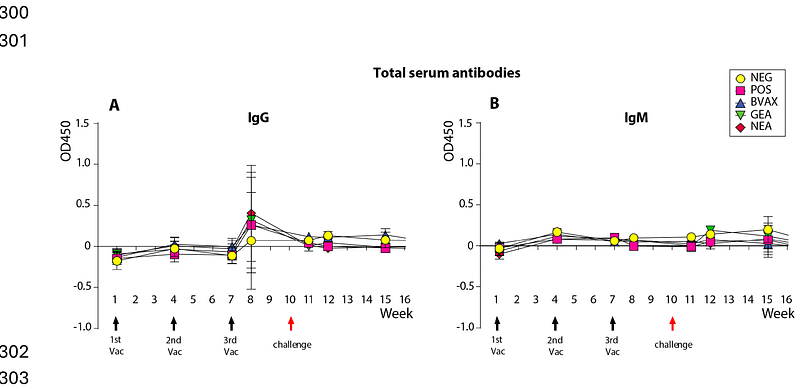Safety and Efficacy of a Novel Glycoengineered Recombinant Vaccine Candidate against Haemonchus contortus in Sheep

Safety and Efficacy of a Novel Glycoengineered Recombinant Vaccine Candidate against Haemonchus contortus in Sheep
Sajovitz-Grohmann, F.; Adduci, I.; Werling, D.; Wiedermann, S.; Wortha, L. N.; Prole, B.; Zloebl, J.; Elster, J.; Tichy, A.; Joachim, A.; Wittek, T.; Hinney, B.; Yan, S.; Lichtmannsperger, K.
AbstractHaemonchus contortus is considered the most pathogenic nematode in small ruminants and South American camelids, causing significant production losses and threatening animal welfare worldwide. Compared to the use of anthelmintic drugs, to which resistance is increasing, vaccination is considered a more sustainable control strategy. The safety and efficacy of a novel glycoengineered vaccine produced in Hi5 insect cells was evaluated in a randomized, controlled vaccination-and-challenge trial. For this, 35 male Jura x Lacaune sheep were assigned to five groups (n=7). Three experimental groups were vaccinated three times subcutaneously with 1 ml of either the commercial Barbervax vaccine, the novel glycoengineered vaccine, consisting of a cocktail of five antigens (H11, H11-1, H11-2, H11-4 and GA1), or its non-glycoengineered counterpart before challenge with 5,000 H. contortus third-stage larvae. Clinical assessments, differential blood counts, serum antibody responses and fecal egg counts were evaluated at least once per week within the 16-week trial period. The abomasal worm burden was counted 40 days after challenge. The results of the mixed model showed a lower degree of anemia (mean packed cell volume (PCV) of 26.77%; mean hemoglobin (Hb) of 9.03 g/dl), in sheep vaccinated with the glycoengineered antigen cocktail compared to the unvaccinated group (PCV of 24.34%; mean Hb of 7.84 g/dl) and to the sheep vaccinated with the non-glycoengineered antigens (PCV of 26.11%; mean Hb of 8.53 g/dl). However, the degree of anemia was lower in sheep vaccinated with native antigens (Barbervax) (PCV of 29.10%; mean Hb of 9.84 g/dl). Serum IgG and IgE antibodies were elevated in all vaccinated groups. Sheep vaccinated with the glycoengineered antigens showed a reduction in abomasal worm burden of 25.36% and a reduction of fecal egg shedding of 81.09%, the group vaccinated with non-glycoengineered antigen showed no worm reduction and a fecal egg count reduction of 32.72%. While there was no significant difference in egg shedding between sheep vaccinated with the glycoengineered antigens and sheep vaccinated with Barbervax (98.32%; p = 0.33), the Barbervax group showed a greater reduction in worm burden (86.40%). The results emphasize that glycoengineering of vaccine candidates is essential to achieve protective immunity against H. contortus in sheep and that the novel glycoengineered vaccine produced in insect cells clearly has the potential to reduce fecal egg shedding and worm burden, paving the way for the development of highly effective recombinant vaccines against this and other parasitic worms in the future.